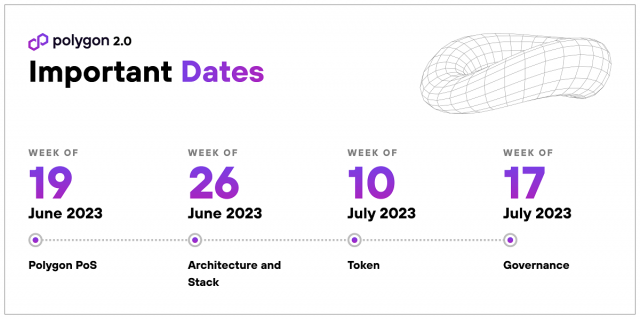
Polygon 2.0 development plan
Polygon Labs, which develops and promotes the network of the crypto asset (virtual currency) Polygon (MATIC), announced on the 12th a development plan for a new Layer 2 scaling solution named “Polygon 2.0”. The solution will leverage Zero Knowledge Proofs (ZK).
Polygon is a project that tackles the scalability problem of Ethereum (ETH). We have developed multiple solutions such as “Polygon PoS” and “Polygon zkEVM” and have been adopted by major companies.
Polygon 2.0 is a series of planned upgrades that rethink the fundamental elements of Polygon, from protocol design to token economics to governance. The initiative has been under discussion for over a year, involving Polygon Labs and the community of developers, researchers, applications, node operators, validators, and both Polygon and Ethereum.

Source: Polygon
Due to the wide range of areas of concern for Polygon 2.0, there will be separate announcements over the next four weeks, followed by a final governance vote.
What is a zero-knowledge proof?
A type of proof protocol that allows a prover to prove that a claim is “truth” without disclosing any information other than “their claim is true” to the verifier.
 Cryptocurrency Glossary
Cryptocurrency Glossary
connection:Polygon-based social layer “Lens Protocol” raises 2 billion yen Tencent and others participate
Cross-chain function
A feature of Polygon 2.0’s architecture emphasizes that cross-chain transactions with other Layer 2 networks are possible without additional trust assumptions. As a result, users will feel as if they are using one continuous chain, and instant and safe mutual use of cross-chains will be possible.
According to Polygon Labs, Polygon 2.0 can theoretically “support an unlimited number of chains, thereby offering infinite scalability and integrated liquidity.” He also emphasized that he has set a goal of creating an “Internet value layer.”
Individual blockchains are not infinitely scalable and have a certain throughput limit. By creating new chains, that capacity can be increased, but this can result in distributed liquidity and reduced security and capital efficiency. However, Polygon 2.0 is designed to eliminate that problem.
The Polygon ecosystem currently has a sidechain called Polygon POS, which hosts major DeFi (decentralized finance) applications such as Uniswap and Aave as a blockchain directly connected to Ethereum. In March 2011, the beta version of Ethereum’s Layer 2 network “Polygon zkEVM” based on the ZK rollup was released, and Aave and Uniswap announced integration with Polygon zkEVM.
What is ZK Rollup
A technology that aggregates transactions, processes them off-chain, and stores only the generated cryptographic proof on the parent blockchain. It uses zero-knowledge proofs and has the feature of significantly reducing costs by processing data with high processing costs off-chain.
 Cryptocurrency Glossary
Cryptocurrency Glossary
connection:Uniswap V3, deployment to Polygon zkEVM decided
The post New development plan “Polygon 2.0” announced, layer 2 network utilizing ZK technology appeared first on Our Bitcoin News.

 2 years ago
133
2 years ago
133














 English (US) ·
English (US) ·